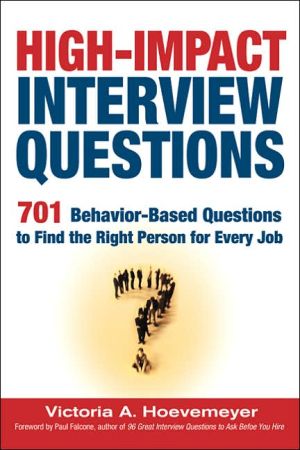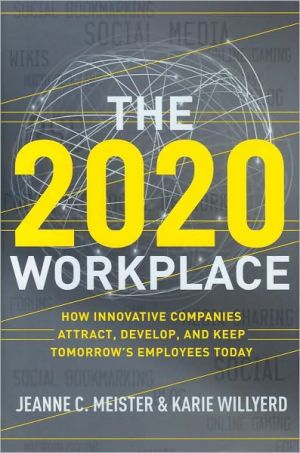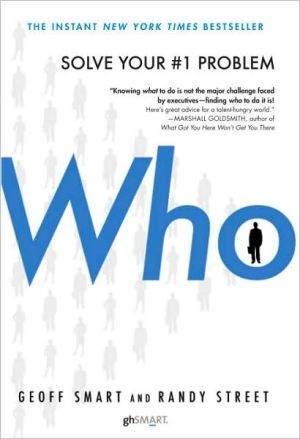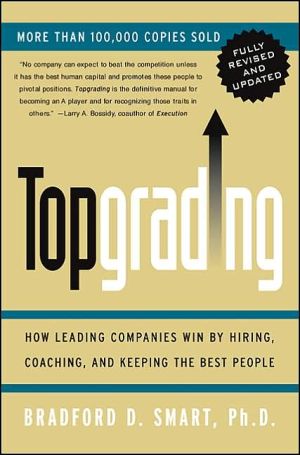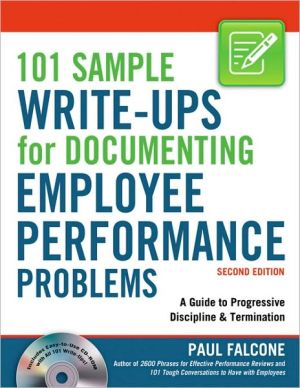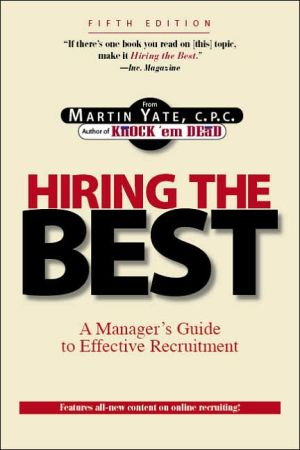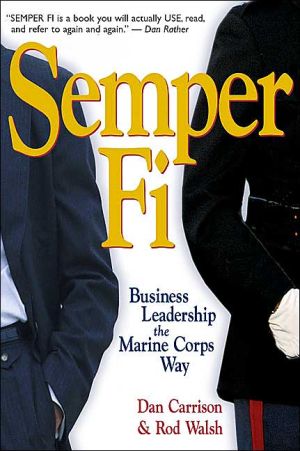High-Impact Interview Questions: 701 Behavior-Based Questions to Find the Right Person for Every Job
"""Tell me about a time...."" The words evoke a child's fairy-tale innocence. Yet when used by an interviewer, they can help to determine the suitability of a job candidate by eliciting real-world examples of behaviors and experience that can save you and your organization from making a bad hiring decision.\ High-Impact Interview Questions shows you how to use competency-based behavioral interviewing methods that will uncover truly relevant and useful information. By having applicants...
Search in google:
This guide to interviewing prospective job candidates suggests drawing on questions about the person's previous job experience to judge their abilities and future performance. Hoevemeyer describes Competency-Based Behavioral Interviewing and provides approximately 700 questions ranging from analytical skills and communication to decision-making and motivation. She also discusses follow-up questions, telephone screening interviews, creating forms, and compiling data. Hoevemeyer is an independent consultant in organizational development. Annotation ©2006 Book News, Inc., Portland, OR
High-Impact Interview Questions\ \ By Victoria A. Hoevemeyer \ AMACOM BOOKS\ Copyright © 2006 Victoria A. Hoevemeyer\ All right reserved.\ ISBN: 0-8144-7301-6 \ \ \ Chapter One\ Interviewing: The Way It Is (Warts and All) \ Behavior-based interviewing, or competency-based interviewing, has been used in some organizations for as long as twenty-five years. Most organizations, however, continue to use a traditional interview format, which is sometimes interlaced with situational (also called scenario, hypothetical, or "what if") interview questions. The new kid on the block that is making its way into interviewing is the brain twister interview question.\ Before getting into competency- or behavior-based interviewing, let's start by taking a look at each of the other interviewing techniques.\ Traditional Interview Questions\ Almost everyone is familiar with traditional interview questions. This would include questions such as:\ * Do you prefer to work alone or in a group?\ * What are your greatest strengths or weaknesses?\ * What did you enjoy most/least about your last position?\ * How would you describe yourself as a person?\ * What kind of books and other publications do you read?\ * Where do you want to be in five years?\ * Why should I hire you?\ * How well do you work under pressure/stress/tight deadlines?\ * How would your coworkers or supervisor describe you?\ * Describe thebest boss you've ever had.\ * Walk me through your work history.\ From an interviewer's standpoint, far too many of us can, in our sleep, ask these types of questions. And we are so familiar with the answers that we can almost recite them word-for-word with the candidate.\ From a candidate's perspective, there are not many people who have interviewed for a position who have not been asked most-if not all-of these questions. While there are some candidates who find comfort in these types of questions because they have pat answers for them, many are frustrated because they feel that their true strengths and potential contributions are not coming through.\ And Their "Unique" Offspring\ I would be remiss if I failed to talk about a variation of the traditional interview question. It is a subcategory of questions that I kindly refer to as "unique." This includes questions such as:\ * Who are your heroes and what makes them your heroes?\ * If you could be any animal in the jungle, which one would you be and why?\ * If you were given a free full-page ad in the newspaper and had to sell yourself in six words or less, how would the ad read?\ * If you could invite three people-living or dead-to lunch, whom would you invite and why?\ * If you were a bicycle, what part would you be?\ * If you had unlimited time and financial assets, what would you do?\ * What is your favorite color and what does it reflect in your personality?\ * If you were on a merry-go-round, what song would you be singing?\ * If your life had a theme song, what would it be?\ There are hiring managers who seriously extol the virtue of questions like these. They swear that the candidate's answers will provide significant insights. By asking such questions, proponents say, they will find out how creative a person is, gain an understanding of the candidate's ability to think on his feet, be able to measure his ability to deal with ambiguity, and be able to determine whether he is able to ... well, you get the idea.\ Advantages of Traditional Interviews\ One of the most significant advantages of the traditional interview format is that people understand it and are comfortable with it. While many candidates are nervous going into an interview, the traditional format-since it is a known interviewing approach-will often put them at ease a little faster than other types of interviews.\ Second, in most situations, traditional interviews allow for a significant number of questions to be asked in a relatively short period of time. Many traditional interview questions require short answers (e.g., "What are your strengths?"). Even for those questions that require a longer answer, the answer tends not to exceed thirty seconds.\ Finally, some traditional questions may reveal fit or non-fit with the position (e.g., "What would your ideal job look like?"), the position's manager (e.g., "What are you looking for in a boss?"), or the organization's culture (e.g., "What kind of organization would you like to work for?").\ The only advantages in sprinkling your interview with "unique" interview questions is that they may help you gauge whether the candidate is able to keep a straight face when confronted with something completely unexpected, and determine whether (but not the extent to which) she can think on her feet.\ What's the problem with "unique" questions? The reality is that these kinds of questions have nothing even remotely to do with the candidate's ability to do the job. They are simply silly, time-wasting questions. Any "insight" an interviewer gains from asking such questions is purely conjecture and supposition. There is no research to indicate that any true predictive value has been found in these questions.\ Further, by asking such "unique" questions you may just put off a strong, highly qualified candidate. There is a relatively large pool of high quality candidates who would question whether they really want to work for a company that uses a person's favorite color as the basis of any part of a hiring decision.\ These are not, by the way, obscure questions I made up. Each and every one of the questions listed above really have been asked of candidates during an interview.\ What's the Problem with Traditional Interviews?\ The major problem with traditional interview questions is that virtually every one of them has become a cliché. There are thousands of books and Web sites that provide candidates with the "right" answer to the "top 100 interview questions." The really creative candidates will also purchase the books and go to the Web sites designed for recruiters and hiring managers. They have found that these resources will provide them with "what to look for when the candidates answers question X." This information, then, enables them to fine-tune their perfect answers to each of your questions.\ Ask most hiring managers which candidate truly stood out in a series of interviews for a particular position, and you are likely to get a blank stare. The primary reason is that it's hard to distinguish one candidate from another, other than through the eloquence of their presentation. Almost every candidate has memorized-in their own words-the "right" answer to all the questions. As a result, what sends one person to the top of the candidate pile is less likely to be his fit with the competencies required for success in the position and more likely to be the hiring manager's "gut feeling" that the person will be successful.\ A final potential issue with traditional interviews is that the same questions are not always asked of every candidate. This raises concerns around how legally defensible many traditional interviews may be, particularly when they are completely unstructured and when the interviewer simply tends to "go with the flow" of each interview and the individual candidate's background.\ Situational Interview Questions\ The second type of question you will find in interviews is situational questions, also referred to as scenario-based interviewing, hypothetical questions, or "what-if" questions. In a situational interview, candidates are asked how they would handle a particular situation. In some situations, this is built around a specific scenario (see the 4th through 7th bullet points below). Questions that fall into this category might include:\ * What would you do if someone higher than you in the organization instructed you to do something that was unethical or illegal?\ * How would you handle a situation where you had conflicting information with which to make a decision?\ * How would you handle an employee who was not performing up to expectations?\ * Your boss has to leave town to handle an urgent customer problem. He has handed off a project to you that needs to be done prior to his return. The project is for the company's president. Initially you feel your boss has done a good job of briefing you on the project, but as you get into it, you have more questions than answers. You aren't able to reach your boss and you are running out of time. What would you do in this situation?\ * A customer brings in a product for repair on Monday. The customer is told that it is a simple repair, and that it would be ready by 3 P.M. on Tuesday. When the customer comes in at 4 P.M. on Tuesday, the product has still not been repaired. The customer is very unhappy. As the service manager, how would you handle the situation?\ * You and a coworker are jointly working on a project. The two of you divided up work in a manner you both agreed to; however, your coworker has not been doing the work she agreed to do. What would you do?\ * You are a member of a cross-functional team dealing with a difficult problem. The team members have diverse views and sometimes hold very strong opinions or positions. You are constantly in conflict with one of the other team members. How would you establish a satisfactory working relationship with this person to accomplish the team's goals?\ What are the advantages of situational interviews? In most situations it is relatively easy to match the candidate's answer to the required answer for the position. For example, if you are looking for a specific six-step process for handling difficult customers, you can check off the steps the candidate lists against the steps used in the organization. This, then, makes it relatively easy to evaluate and rate the answer. You get different information for the candidate who hits only on two of the six steps, than for the candidate who got all six steps but got two of them mixed up in order, or the candidate who lists and explains all six steps in the exact order you have listed.\ If you are interviewing entry-level people who may have limited experience, but who have a wide knowledge base, these types of questions may be appropriate. They will, at least, tell you that the candidate knows, intellectually, the process that should be used to address certain situations.\ The Problem with Situational/Hypothetical Questions\ The primary problem with hypothetical questions is that they assume that people actually do as they say they will do (or act as they say they will act). This, as we all know, doesn't always happen. For example, I have been facilitating skill-based conflict management programs for about fifteen years. I could walk a trained monkey (and maybe even an untrained one) through the steps. How often do you think I use that process when, after asking three times, I still don't have the information that I asked for in the report. Let me give you a hint: not often!\ For many of us there is, unfortunately, very little correlation between knowing the right thing to do or the right process to follow and actually doing the right thing under pressure, while distracted, when in a time crunch, and sometimes even when everything is calm.\ Some hiring managers feel that they are able to get around this disconnect by asking a follow-up question like, "Give me an example of when you used this skill or process." And then guess what happens? Almost 100 percent of the time, the candidates' examples will match, letter for letter, word for word, the exact process or skill steps they just described. Does that mean that they practice what they preach? Maybe. But maybe it just means that they are good at putting the "right" process or skill steps into a nice illustrative story and tying it up with a pretty bow for you.\ Brainteaser Interview Questions\ The third category of questions is just recently making an appearance in mainstream interviewing. It was "pioneered" by Microsoft and has been used by many of the high-tech companies for a number of years. This category includes questions such as:\ * If you could remove any one of the fifty U.S. states, which would it be and why?\ * If you stood quarters up on end, how many would you need to equal the height of the Empire State Building?\ * What does all the ice in a hockey rink weigh?\ * How would you manage a project to get everyone in the United States to drive on the left-hand side of the road?\ * Why are manhole covers round?\ * How would you weigh an airplane without using a scale?\ Proponents of the brainteaser interview questions indicate that these types of questions will provide information on:\ * How well the person performs under stress\ * The processes the candidate uses to analyze a problem\ * How creative or innovative a solution the candidate can come up with\ * How intelligent the person is\ * How the person reacts to unanticipated challenges or difficult problems\ What are the advantages of brainteaser interviews? A hiring manager might want to consider asking a brainteaser question when interviewing a relatively new graduate for a highly technical position. This may give the candidate an opportunity to demonstrate his analytical thinking skills when practical experience is not available.\ Another potential advantage of a brainteaser question (not an interview based on them, though) would be the opportunity to gauge a candidate's reaction to the playfulness and innovation that can be inherent in a brainteaser question (assuming, that is, that she enjoys that kind of mental gymnastics). It would also give the interviewer an opportunity to eavesdrop on the candidate's thinking processes.\ The Problem with Brainteaser Questions\ There is no problem if you listen to and believe in people like William Poundstone, author of How Would You Move Mount Fuji, who says, "If you don't judge people on the basis of something like these puzzles, you're probably going to be judging them on the basis of how firm their handshake is or whether you like how they're dressed, which are even less relevant." However, as quoted in Thad Peterson's Monster.Com article, "Brainteaser or Interview Torture Tool," Poundstone also points out that "while various industries have glommed onto this interviewing trend, it makes little sense for many types of workers."\ According to proponents, brainteaser questions will tell you how the person thinks, how smart they are, as well as highlight their "rational" and "logical" thinking, planning, and problem-solving and decision-making skills and facilities. It will also, some pundits say, show you how people process information.\ Proponents say that these types of questions will lead to creative and original answers that haven't been rehearsed by the candidate. While this may still be the case at this point, there will come a time-most likely sooner than later-when this will not be true. There are an increasing number of books and Internet sites that provide the "right" answer (or the "preferred thought process") for answering many of these questions. It is possible that, in a short period of time, there will be a plethora of candidates interviewing at companies known for using this technique who already know the answers to the questions.\ This could lead to an interesting situation. Imagine this situation:\ You ask a candidate a brainteaser question during an interview. Unbeknownst to you, the candidate knows the "right" answer to the question. Because she wants the job, and because she knows she can "fake" thinking through the question out loud, she chooses to play the game and answer the question.\ Since you will never know whether the candidate already knew the answer to the question, or whether she was smart enough to figure out the "right" answer, does it cause you to question the value of these types of questions?\ I won't argue the point that it is important to understand where a candidate's skill level is and, when appropriate, to know their level of creativity. However, what I have not been able to figure out for the life of me is how someone's answer to "How many piano tuners are there in Chicago?" is going to enable you to determine his fit with the competencies and skill or knowledge requirements for the position. You can, of course, make suppositions and assumptions, but do you really want to hire someone that way?\ (Continues...)\ \ \ \ \ Excerpted from High-Impact Interview Questions by Victoria A. Hoevemeyer Copyright © 2006 by Victoria A. Hoevemeyer. Excerpted by permission.\ All rights reserved. No part of this excerpt may be reproduced or reprinted without permission in writing from the publisher.\ Excerpts are provided by Dial-A-Book Inc. solely for the personal use of visitors to this web site. \ \
Ch. 1Interviewing : the way it is (warts and all)5Ch. 2The what, when, and why of competency-based behavioral interviewing17Ch. 3Competency-based behavioral interview questions39Ch. 4Probing or follow-up questions105Ch. 5Initial telephone screening interview111Ch. 6Creating the interview guide127Ch. 7Assembling the interviewer data149Ch. 8Where do you go from here?153
\ From the Publisher“... a good book to look over when preparing for interviews or to stimulate your thinking.”\ -Career Opportunities News\ "An excellent resource." --Los Angeles Times, nationally syndicated columnist Mark Goulston\ \ \
